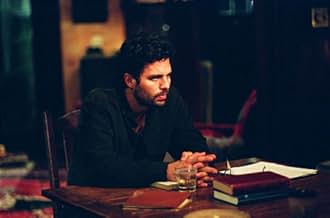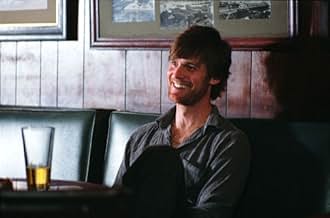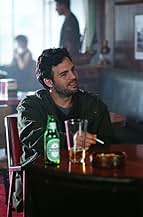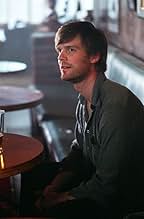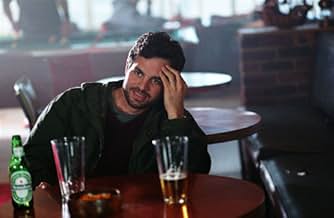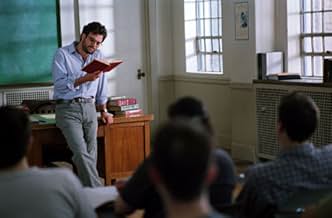CALIFICACIÓN DE IMDb
6.2/10
10 k
TU CALIFICACIÓN
Una indiscreción entre dos amigos íntimos destruye sus respectivos matrimonios.Una indiscreción entre dos amigos íntimos destruye sus respectivos matrimonios.Una indiscreción entre dos amigos íntimos destruye sus respectivos matrimonios.
- Dirección
- Guionistas
- Elenco
- Premios
- 2 premios ganados y 4 nominaciones en total
- Dirección
- Guionistas
- Todo el elenco y el equipo
- Producción, taquilla y más en IMDbPro
Opiniones destacadas
A serious and emotionally engaging melodrama that tells of two marriages, of love, friendship, adultery, faithfulness, parenting, and the delicate balance between being true to the spirit within and being responsible about the consequences in the real world.
Mark Ruffalo and Peter Krause play two college tutors of English literature, working away and also trying to get published in their own right in their spare time. They are close buddies and have loving, beautiful wives (Naomi Watts and Laura Dern). We have four 'ordinary people' who are far from caricatures they have sensitivities, intelligence, emotional aspiration and weakness as they struggle with their own stymied abilities to find happiness and fulfilment both for themselves and the ones they love.
We Don't Live Here Anymore looks at the reality of marriage in a less than rose-tinted light. The performances by Watts and Dern shine forth with increasing emotional intensity, and the efforts of their husbands to stage-manage some sort of acceptable compromise ricochet on the fringes of a dark despair that forever looms and threatens to engulf everyone. As the characters realise their increasingly complex shenanigans are verging on disaster, it leads them to ever deeper self-examination of their true feelings. And yet sometimes the children have a greater realisation of what's going on than do their parents. The film's closing scene ("Because I can") reminds us that the element of choice, true and ongoing, is so often lacking in marriage, sometimes even in relatively small things once marriage has been consummated, the rest becomes duty and infidelity is often driven by compulsion - so the elements of ongoing freewill (jointly and singly) can be hard to find.
This movie has been compared to Closer and rightly so it is for mature, thinking audiences who can come to terms with deep imperfections and use the depths of what it takes to be truly human to make things better (or find a way forward that has emotionally honesty). The 'moral right' will dismiss both films not so much out of a sense of superiority ('adultery never pays') but simply through lack of understanding.
The heavy-going nature of the film is alleviated by shots of rare beauty in the surrounding countryside, elegantly photographed, and by the playfulness of the several children. Watts (nearly 38 but still looking 24) and Dern (who appears older, but attractive in a very different way) each show elements of femininity that their characters are desperate to satisfy the need to be wanted and the need to be loved. To appreciate the film it is necessary to see the scenarios from both the viewpoints of the women and of the men. Everybody cares about the kids. Beyond that, the love that is expected of the spouse is at odds with the love that they try to give, so they all feel like 'objects' to their respective partners. The lack of understanding breaks down into infidelity, which (so the film might argue) can almost be a healing balm. "It's much easier living with a woman who feels loved", remarks a cuckolded husband. It's a film where no-one has all the answers (though not for want of trying) and so in some ways a testament to humanity. Sadly, many will see it as just another cynical take on dysfunctional relationships, but the open minded viewer may find a lot more, for this film is a well-made (if not exceptional) work of art that contributes more to the understanding of the human condition than any cutesy, idealised portrayal of happy families.
Mark Ruffalo and Peter Krause play two college tutors of English literature, working away and also trying to get published in their own right in their spare time. They are close buddies and have loving, beautiful wives (Naomi Watts and Laura Dern). We have four 'ordinary people' who are far from caricatures they have sensitivities, intelligence, emotional aspiration and weakness as they struggle with their own stymied abilities to find happiness and fulfilment both for themselves and the ones they love.
We Don't Live Here Anymore looks at the reality of marriage in a less than rose-tinted light. The performances by Watts and Dern shine forth with increasing emotional intensity, and the efforts of their husbands to stage-manage some sort of acceptable compromise ricochet on the fringes of a dark despair that forever looms and threatens to engulf everyone. As the characters realise their increasingly complex shenanigans are verging on disaster, it leads them to ever deeper self-examination of their true feelings. And yet sometimes the children have a greater realisation of what's going on than do their parents. The film's closing scene ("Because I can") reminds us that the element of choice, true and ongoing, is so often lacking in marriage, sometimes even in relatively small things once marriage has been consummated, the rest becomes duty and infidelity is often driven by compulsion - so the elements of ongoing freewill (jointly and singly) can be hard to find.
This movie has been compared to Closer and rightly so it is for mature, thinking audiences who can come to terms with deep imperfections and use the depths of what it takes to be truly human to make things better (or find a way forward that has emotionally honesty). The 'moral right' will dismiss both films not so much out of a sense of superiority ('adultery never pays') but simply through lack of understanding.
The heavy-going nature of the film is alleviated by shots of rare beauty in the surrounding countryside, elegantly photographed, and by the playfulness of the several children. Watts (nearly 38 but still looking 24) and Dern (who appears older, but attractive in a very different way) each show elements of femininity that their characters are desperate to satisfy the need to be wanted and the need to be loved. To appreciate the film it is necessary to see the scenarios from both the viewpoints of the women and of the men. Everybody cares about the kids. Beyond that, the love that is expected of the spouse is at odds with the love that they try to give, so they all feel like 'objects' to their respective partners. The lack of understanding breaks down into infidelity, which (so the film might argue) can almost be a healing balm. "It's much easier living with a woman who feels loved", remarks a cuckolded husband. It's a film where no-one has all the answers (though not for want of trying) and so in some ways a testament to humanity. Sadly, many will see it as just another cynical take on dysfunctional relationships, but the open minded viewer may find a lot more, for this film is a well-made (if not exceptional) work of art that contributes more to the understanding of the human condition than any cutesy, idealised portrayal of happy families.
An ernest dose of claustrophobia
We Don't Live Here Anymore begins with two couples having a semi drunken party. At least Terry (Laura Dern), Jack's wife, is getting drunk, a thing she does pretty often. They've run out of beer and Jack (Mark Ruffalo) and Edith (Naomi Watts), who's the wife of Hank (Peter Krause) go to get some. Later that night the first fight occurs between Jack and Terry. This isn't the first time Jack has run off with Edith on little improvised errands and they've come to make Terry suspicious -- and she's right: Edith and Jack are soon getting it on outside on a blanket. The two couples' lives are intertwined. Jack and Hank work in the same college English department, Jack teaching literature and Hank creative writing, an activity at which he is not a success, though acceptance of one of his poems by The New Yorker is one of the few positive and non-adulterous events in the movie. The two men also go out on runs together -- sweaty, huffy, ridiculously competitive and un-fun slogs on deserted roads, followed by a beer at a pub. Edith and Jack continue to sneak off to have sex, Terry remains suspicious, and Hank doesn't seem to care either about Edith or about anybody but himself and his unsuccess, though being a habitual philanderer often on the prowl (mostly for girl students), he eventually he scares up some lust for Terry, who's eager for that kind of revenge once she knows what Jack is up to.
There's no question about the fact that Ruffalo, Watts, Dern, and Krause do their best to flesh out what, by the film's end, still appear to be rather undefined roles underwritten and equally unsimpatico. There's no doubt about Terry's volatility and anger and Edith's cool withdrawal and intense need. Hank is laid back and self absorbed, and in one of his typically complex portrayals of a ne'er-do-well, Mark Ruffalo as Jack combines needy, querulous, hostile, and sexy with a resultingly vivid but unappealing effect -- which one could also say for Laura Dern's energetic and committed portrayal. The actors do interesting (if somewhat unrewarding) work; they're better than the material. So are the designer, who's composed wonderful interiors, and the cinematographer, who has made them translucent and real. But this is a drama so focused on adultery that the adultery itself remains incompletely described as an experience. Where's the guilt? Where's the excitement? We Don't Live Here Anymore has too little to say about anything else in life other than the mechanisms of infidelity including the way children get caught in the crossfire. Though there is plenty of drinking and some smoking (Edith and Jack indulge in the latter secret vice after their secret sex sessions), the characters don't even seem to have time to sit down and eat and there's only the most smarmy and limited depiction of the men at work in the classroom, or their offices. For men and women of intelligence, these people show little brains and wit.
The friend I saw this movie with dwelt on the retro nature of the women's roles. This is a serious flaw because there's been no effort to show that the story material is from the Seventies. It's unlikely, perhaps nearly impossible, for two assistant professors at a college in the northwest nowadays to both have wives who do nothing but cook, clean house, and mind the kids. This is just one indication of a certain clumsiness in the story adaptations that are also slim on motivation and personality. We Don't Live Here Anymore is only a `good' movie in the sense that it's a grownup treatment of a grownup theme with a certain polish and a talented cast. But it's extremely claustrophobic without the compensation one might find in Bergman, say, of a growing intensity, of leaving one with powerful emotions. Jack and Terry and Hank and Edith may sputter and lash at one another at times, but they don't seem to know about or care about themselves or each other enough to make the viewer care too.
It's hard to describe the action, which slides from scene to scene gratuitously slipping in a shot or two from another scene, such as Jack and Edith's first sex outdoors, or cutting back and forth from one couple and house to the other. Do we have to have that? Why not do one thing at a time? This is where I love the French linear clarity of Eric Rohmer. He takes one conversation at a time. No slippery flash cut peeks at other people during a conversation. Sure, Eric Rohmer's cinema is a highly formalized version of life. But what is We Don't Live Here Anymore? All these things are artificial. There are no climaxes, and there's neither passion nor brilliance. One can't help thinking of the excitement, both emotional and intellectual, aroused by a good production of Who's Afraid of Virginia Wolf, beside which We Don't Live Here Anymore almost seems to slink away in shame. And compared to the lighthearted stimulation of watching an Eric Rohmer film, this one is more like taking a dose of castor oil.
We Don't Live Here Anymore begins with two couples having a semi drunken party. At least Terry (Laura Dern), Jack's wife, is getting drunk, a thing she does pretty often. They've run out of beer and Jack (Mark Ruffalo) and Edith (Naomi Watts), who's the wife of Hank (Peter Krause) go to get some. Later that night the first fight occurs between Jack and Terry. This isn't the first time Jack has run off with Edith on little improvised errands and they've come to make Terry suspicious -- and she's right: Edith and Jack are soon getting it on outside on a blanket. The two couples' lives are intertwined. Jack and Hank work in the same college English department, Jack teaching literature and Hank creative writing, an activity at which he is not a success, though acceptance of one of his poems by The New Yorker is one of the few positive and non-adulterous events in the movie. The two men also go out on runs together -- sweaty, huffy, ridiculously competitive and un-fun slogs on deserted roads, followed by a beer at a pub. Edith and Jack continue to sneak off to have sex, Terry remains suspicious, and Hank doesn't seem to care either about Edith or about anybody but himself and his unsuccess, though being a habitual philanderer often on the prowl (mostly for girl students), he eventually he scares up some lust for Terry, who's eager for that kind of revenge once she knows what Jack is up to.
There's no question about the fact that Ruffalo, Watts, Dern, and Krause do their best to flesh out what, by the film's end, still appear to be rather undefined roles underwritten and equally unsimpatico. There's no doubt about Terry's volatility and anger and Edith's cool withdrawal and intense need. Hank is laid back and self absorbed, and in one of his typically complex portrayals of a ne'er-do-well, Mark Ruffalo as Jack combines needy, querulous, hostile, and sexy with a resultingly vivid but unappealing effect -- which one could also say for Laura Dern's energetic and committed portrayal. The actors do interesting (if somewhat unrewarding) work; they're better than the material. So are the designer, who's composed wonderful interiors, and the cinematographer, who has made them translucent and real. But this is a drama so focused on adultery that the adultery itself remains incompletely described as an experience. Where's the guilt? Where's the excitement? We Don't Live Here Anymore has too little to say about anything else in life other than the mechanisms of infidelity including the way children get caught in the crossfire. Though there is plenty of drinking and some smoking (Edith and Jack indulge in the latter secret vice after their secret sex sessions), the characters don't even seem to have time to sit down and eat and there's only the most smarmy and limited depiction of the men at work in the classroom, or their offices. For men and women of intelligence, these people show little brains and wit.
The friend I saw this movie with dwelt on the retro nature of the women's roles. This is a serious flaw because there's been no effort to show that the story material is from the Seventies. It's unlikely, perhaps nearly impossible, for two assistant professors at a college in the northwest nowadays to both have wives who do nothing but cook, clean house, and mind the kids. This is just one indication of a certain clumsiness in the story adaptations that are also slim on motivation and personality. We Don't Live Here Anymore is only a `good' movie in the sense that it's a grownup treatment of a grownup theme with a certain polish and a talented cast. But it's extremely claustrophobic without the compensation one might find in Bergman, say, of a growing intensity, of leaving one with powerful emotions. Jack and Terry and Hank and Edith may sputter and lash at one another at times, but they don't seem to know about or care about themselves or each other enough to make the viewer care too.
It's hard to describe the action, which slides from scene to scene gratuitously slipping in a shot or two from another scene, such as Jack and Edith's first sex outdoors, or cutting back and forth from one couple and house to the other. Do we have to have that? Why not do one thing at a time? This is where I love the French linear clarity of Eric Rohmer. He takes one conversation at a time. No slippery flash cut peeks at other people during a conversation. Sure, Eric Rohmer's cinema is a highly formalized version of life. But what is We Don't Live Here Anymore? All these things are artificial. There are no climaxes, and there's neither passion nor brilliance. One can't help thinking of the excitement, both emotional and intellectual, aroused by a good production of Who's Afraid of Virginia Wolf, beside which We Don't Live Here Anymore almost seems to slink away in shame. And compared to the lighthearted stimulation of watching an Eric Rohmer film, this one is more like taking a dose of castor oil.
This is a difficult film to sit through. It presents a lot of morality issues that are unnerving. Andre Dubus' work always asked a lot of questions about human relations like the ones that are presented here from two of his short pieces.
It takes courage to take this material and bring it to the screen. Naomi Watts appears as one of the producers and she is to be congratulated even though we might be turned off by what we are watching. John Curran's directing the screen play from Larry Gross shows he has an eye for the material even though the pace is slow.
The actual victims of the affairs of Jack and Terry and Hank and Edith, are their children. It is obvious the two daughters are going to be scarred for life. They see and understand a lot more, than they might seem to, well beyond their young ages. In fact, it appears both girls know what their parents are doing.
It's easy to have an extra marital affair, but people entering into a relationship such as the quartet in this film do, have to realize they ultimately have to pay for their actions. Jack realizes it at the last moment. He knows he can't leave his son and daughter behind. Edith, on the other hand, had no problem continuing seeing Jack, as long as it was cool with him.
Hank, the young English teacher, whose poem is published by The New Yorker, lives in a fantasy world. We don't see him attached to his daughter Sharon, the same way we know Jack is to his children. He hits on the female students without any problems. He couldn't care less what his own wife is doing.
Terry, on the other hand, has to prove herself. She is a woman that has seen better days. Her beauty is fading and her house is a mess. On the other hand, Edith's house is spotless. These two women are going through a turmoil in their lives.
The only positive thing is what Jack goes through when he takes the children to the river and suddenly we don't know whether he wants to kill them, or not. The idea of losing them is what makes him, at long last, see the light. We also get to see a contrite Edith leaving with her daughter Sharon toward the train tracks; there is a hint of a possible suicide attempt, but no, she wants to start a new life and making a new start. Edith, also, realizes too late how she has harmed her daughter.
The acting is excellent. Mark Ruffalo keeps changing from film to film. He is an interesting actor no matter what a movie asks him to do. The real revelation is Laura Dern. Her Terry is a composite of women of a certain age that suddenly realize they are not going anywhere and they have made mistakes along the way, almost losing her husband and family. Peter Krause is also effective as Hank, the callous writer in love with himself. Naomi Watts is the one that doesn't fare as well. Her Edith is an enigma. She is a woman obsessed with sex with another man, but at times we don't see enough heat coming from her.
Ultimately, the two young girls that play the two daughters, Jennifer Bishop, and Haili Page make their characters seem real without doing much, which is an accomplishment.
It takes courage to take this material and bring it to the screen. Naomi Watts appears as one of the producers and she is to be congratulated even though we might be turned off by what we are watching. John Curran's directing the screen play from Larry Gross shows he has an eye for the material even though the pace is slow.
The actual victims of the affairs of Jack and Terry and Hank and Edith, are their children. It is obvious the two daughters are going to be scarred for life. They see and understand a lot more, than they might seem to, well beyond their young ages. In fact, it appears both girls know what their parents are doing.
It's easy to have an extra marital affair, but people entering into a relationship such as the quartet in this film do, have to realize they ultimately have to pay for their actions. Jack realizes it at the last moment. He knows he can't leave his son and daughter behind. Edith, on the other hand, had no problem continuing seeing Jack, as long as it was cool with him.
Hank, the young English teacher, whose poem is published by The New Yorker, lives in a fantasy world. We don't see him attached to his daughter Sharon, the same way we know Jack is to his children. He hits on the female students without any problems. He couldn't care less what his own wife is doing.
Terry, on the other hand, has to prove herself. She is a woman that has seen better days. Her beauty is fading and her house is a mess. On the other hand, Edith's house is spotless. These two women are going through a turmoil in their lives.
The only positive thing is what Jack goes through when he takes the children to the river and suddenly we don't know whether he wants to kill them, or not. The idea of losing them is what makes him, at long last, see the light. We also get to see a contrite Edith leaving with her daughter Sharon toward the train tracks; there is a hint of a possible suicide attempt, but no, she wants to start a new life and making a new start. Edith, also, realizes too late how she has harmed her daughter.
The acting is excellent. Mark Ruffalo keeps changing from film to film. He is an interesting actor no matter what a movie asks him to do. The real revelation is Laura Dern. Her Terry is a composite of women of a certain age that suddenly realize they are not going anywhere and they have made mistakes along the way, almost losing her husband and family. Peter Krause is also effective as Hank, the callous writer in love with himself. Naomi Watts is the one that doesn't fare as well. Her Edith is an enigma. She is a woman obsessed with sex with another man, but at times we don't see enough heat coming from her.
Ultimately, the two young girls that play the two daughters, Jennifer Bishop, and Haili Page make their characters seem real without doing much, which is an accomplishment.
"We Don't Live Here Anymore" is a sophisticated examination of the complexities of the difficult relationship that is contemporary marriage and family.
As it takes us awhile in the beginning to figure out who is attached in what couple, Mark Ruffalo, Laura Dern, Peter Krause and Naomi Watts superbly act a matched quartet of grown-up friends whose restlessness and frustrations with their personal and professional lives are gradually torn to shreds by propinquity and alcohol (and perhaps by community college teachers having too flexible schedules and temptations). The suspense comes in the revelation of the layers that get peeled off each and we wonder just how far each will go.
Each actor finds a unique response to their character's emotional situation and the production design well illustrates their individuality (though once again in a film I got fooled that I was supposed to think ill of a character like Dern's whose comfortable house is evidently a mess when it looks like mine, while I thought Watts' house was really cold in its spotlessness while gradually I realized I was supposed to think she was more together, but heck she had one less kid).
While I haven't read yet the two Andre Dubos short stories that Larry Gross adapted for the screenplay, Ruffalo's voice-over is used inconsistently as an occasional crutch to reveal inner thoughts probably to help bolster the denouement; otherwise the camera angles try to convey their thoughts, but that manipulates the audience a bit as to whom to root for.
Maryse Alberti's cinematography richly conveys summer passing in a beautiful yet claustrophobic college town.
The song selections are not particularly revelatory, but the music is effective at mood-setting.
As it takes us awhile in the beginning to figure out who is attached in what couple, Mark Ruffalo, Laura Dern, Peter Krause and Naomi Watts superbly act a matched quartet of grown-up friends whose restlessness and frustrations with their personal and professional lives are gradually torn to shreds by propinquity and alcohol (and perhaps by community college teachers having too flexible schedules and temptations). The suspense comes in the revelation of the layers that get peeled off each and we wonder just how far each will go.
Each actor finds a unique response to their character's emotional situation and the production design well illustrates their individuality (though once again in a film I got fooled that I was supposed to think ill of a character like Dern's whose comfortable house is evidently a mess when it looks like mine, while I thought Watts' house was really cold in its spotlessness while gradually I realized I was supposed to think she was more together, but heck she had one less kid).
While I haven't read yet the two Andre Dubos short stories that Larry Gross adapted for the screenplay, Ruffalo's voice-over is used inconsistently as an occasional crutch to reveal inner thoughts probably to help bolster the denouement; otherwise the camera angles try to convey their thoughts, but that manipulates the audience a bit as to whom to root for.
Maryse Alberti's cinematography richly conveys summer passing in a beautiful yet claustrophobic college town.
The song selections are not particularly revelatory, but the music is effective at mood-setting.
Not a heart-wrenching film but illuminates with precision the dynamics of friendship, marriage and adultery. It shows a potent portrait of two couples whose marriages are going to break; has an enormous power and tells some uncomfortable truths. In this movie actions have consequences that are not resolved with a hug or a cry. The four grown-ups (as well as their children who are perfectly aware of the situation) are very talented and all deliver passionate and compulsive performances. The atmosphere lingering in the air is what impressed me the most, being the flick filled with very expressive glances and electrical silences. Mark Ruffalo and Naomi Watts always very gifted.
¿Sabías que…?
- TriviaThe Irish step dance scene starts with a cutaway where the center dancer is actually a male dancer.
- Citas
[last lines]
Edith Evans: I'm not leaving you because you're unfaith Hank, I'm leaving because I was.
Hank Evans: Look, none of that matters any more. It's over. Isn't it? Isn't it, Edith?
Edith Evans: Yeah. It's over.
Hank Evans: Well then, why leave now?
Edith Evans: Because I can.
- Créditos curiososSpecial Thanks To Christine & Ben Christine, Terry & Kelly Kris & Fisher
- ConexionesFeatured in The 20th IFP Independent Spirit Awards (2005)
- Bandas sonorasJungle Warrior
Written by John Otieno
Performed by Matata
Courtesy of President Records Ltd. UK
Selecciones populares
Inicia sesión para calificar y agrega a la lista de videos para obtener recomendaciones personalizadas
- How long is We Don't Live Here Anymore?Con tecnología de Alexa
Detalles
- Fecha de lanzamiento
- Países de origen
- Sitios oficiales
- Idioma
- También se conoce como
- We Don't Live Here Anymore
- Locaciones de filmación
- Productoras
- Ver más créditos de la compañía en IMDbPro
Taquilla
- Presupuesto
- USD 3,000,000 (estimado)
- Total en EE. UU. y Canadá
- USD 2,041,014
- Fin de semana de estreno en EE. UU. y Canadá
- USD 101,295
- 15 ago 2004
- Total a nivel mundial
- USD 3,361,213
- Tiempo de ejecución1 hora 41 minutos
- Color
- Mezcla de sonido
- Relación de aspecto
- 2.35 : 1
Contribuir a esta página
Sugiere una edición o agrega el contenido que falta

Principales brechas de datos
What is the Spanish language plot outline for La Tentación (2004)?
Responda

